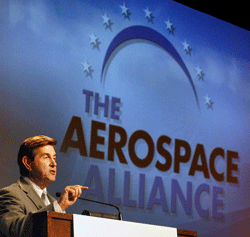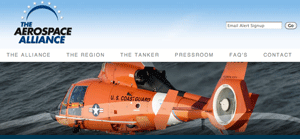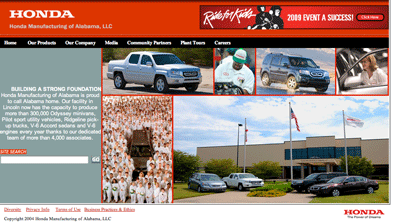By George Talbot, Political Editor for the Mobile Press Register
 The economic battle for jobs and capital investment pits the Pacific Northwest against a rising challenger in the Southeast. The regional fight is fiercest over the U.S. Air Force tanker contract, a potential 179-plane order that could deliver thousands of aircraft assembly jobs either to Mobile, Alabama, or Everett, Washington. Coupled with Boeing Co.’s recent decision to assemble 787 aircraft in Charleston, S.C., the high-profile tanker contest could be the tipping point in a larger trend that has seen aerospace firms shifting production to the low-cost South.
The economic battle for jobs and capital investment pits the Pacific Northwest against a rising challenger in the Southeast. The regional fight is fiercest over the U.S. Air Force tanker contract, a potential 179-plane order that could deliver thousands of aircraft assembly jobs either to Mobile, Alabama, or Everett, Washington. Coupled with Boeing Co.’s recent decision to assemble 787 aircraft in Charleston, S.C., the high-profile tanker contest could be the tipping point in a larger trend that has seen aerospace firms shifting production to the low-cost South.
A Little-Known Success Story
In so doing, they’re following a trail already blazed by automotive manufacturers. The Deep South has become a magnet for automakers, landing six of the last seven assembly plants announced in the past 10 years and helping to spell the end of Detroit.
source: www.slcatlanta.org/Publications/EconDev/drivingtheeconomy.pdf
Fields that once produced cotton and peanuts are now home to some of the world’s most advanced and efficient auto plants. The list includes BMW in South Carolina, Kia in Georgia, Nissan and Toyota in Mississippi and Honda, Hyundai and Mercedes Benz in Alabama, collectively representing nearly $10 billion in new investment. “You can look back over the last 10-12 years with regard to the automobile industry in the South and you are about to see the same thing with regard to aviation and aerospace,” said Alabama Governor Bob Riley.
The difference for aircraft and defense firms is that they’re entering a region where the aerospace industry is already well-established, and where there is a long tradition of supporting the military. The industry today accounts for nearly 900,000 jobs across the South, with tens of thousands more in the pipeline under projects announced by Airbus, Boeing, Northrop Grumman Corp. and Spirit Aerosystems.
The industry’s growth is a little-known story, even south of the Mason-Dixon line. But Southern political leaders, eager to seize momentum, are banding together to promote the region as an emerging market for aerospace investment. The marketing campaign is centered on the Aerospace Alliance, a four-state coalition whose goal is to establish the Gulf Coast region as a world class aviation, aerospace and defense corridor. “This alliance will go far in promoting our region for what it is – one of the largest aerospace corridors in the world and a great place for companies in this sector to do business,” said Mississippi Governor Haley Barbour. “The Gulf Coast states share geographic proximity, a long tradition of aerospace and aviation activities and a skilled and experienced workforce, and by joining together, we will be well-positioned to take advantage of opportunities to grow this sector in our region.”
The 150-mile corridor, stretching from Pensacola to New Orleans, already is home to a string of leading aerospace manufacturers, key NASA facilities and military aviation bases operated by the Air Force, Navy and Coast Guard.
A business-friendly environment attractive to Boeing, EADS and Northrop and already home to more than 700 aviation and aerospace companies

Supporters of the initiative — led by Riley, Barbour and Louisiana Gov. Bobby Jindal — say South also offers strong right-to-work laws that have discouraged labor unions. “You don’t have to worry about workers being out on strike when America needs them,” Barbour said at a news conference announcing the alliance in October.
It’s that business-friendly climate that recently led Boeing, much to the disappointment of political and labor leaders in the Northwest, to select South Carolina as the site of a second assembly line for its 787 Dreamliner. The decision to spurn the Seattle area, its longtime production home, for Charleston was met with outrage in Washington state, which fought hard for the $730 million project. “Our decision to come to South Carolina will be good for our competitiveness, for our customers, and for our country,” said Boeing chief executive Jim McNerney. “My impression was that the people here are hard working, dedicated, willing to learn and anxious to be a part of aerospace history.”

Boeing’s move is seen as a crowning achievement for the industry in the South because it could draw thousands of additional jobs at supplier plants, creating critical mass for future investments. It’s also helped undercut criticism from Puget Sound that Southerners aren’t capable of complex manufacturing.
The blows have been sharpest over the Air Force tanker contract. Boeing is battling a trans-Atlantic team led by Northrop Grumman Corp. and the European Aeronautic Defence and Space Co. in a contest with broad implications for the global aerospace industry. EADS, parent company of Airbus, views the competition as an opportunity to gain a long-sought foothold on U.S. soil. If it can land a piece of the tanker contract, Airbus would add production of A330 freighters at its proposed $600 million production center in Mobile.
That would give the U.S. a second center of commercial aircraft production to balance Boeing’s traditional hub in the northwest. Analysts speculate that Airbus eventually could shift production of its full A330 line to Mobile from Toulouse, France, dramatically expanding its U.S. footprint. The move would establish a state-of-the-art production facility and create a new generation of aerospace workers at a time when top military officials are expressing deep concerns about the American defense industrial base.
Los Angeles-based Northrop has projected that its KC-45 tanker program would create 1,500 direct jobs in Mobile and 48,000 jobs nationwide. Boeing has said the contract would secure a similar number of jobs on its existing assembly lines in Everett and at its modification center in Wichita, Kansas.
Southern political leaders said the alliance’s first priority is to help win the tanker contract, establishing Mobile as a cornerstone for the industry’s growth along the Gulf Coast. But they said the tanker isn’t their only priority. “Our region is already a major player – home to over 700 aviation and aerospace companies,” Riley said, adding that “now it is up to us, that any time anyone anywhere in the country talks about aviation, about space … to make them understand there is an aerospace corridor here that will rival any you’ll find anywhere in the world.” (see: Governor Riley’s interview with Talbot and Laird).
———-
***Posted December 21st, 2009


